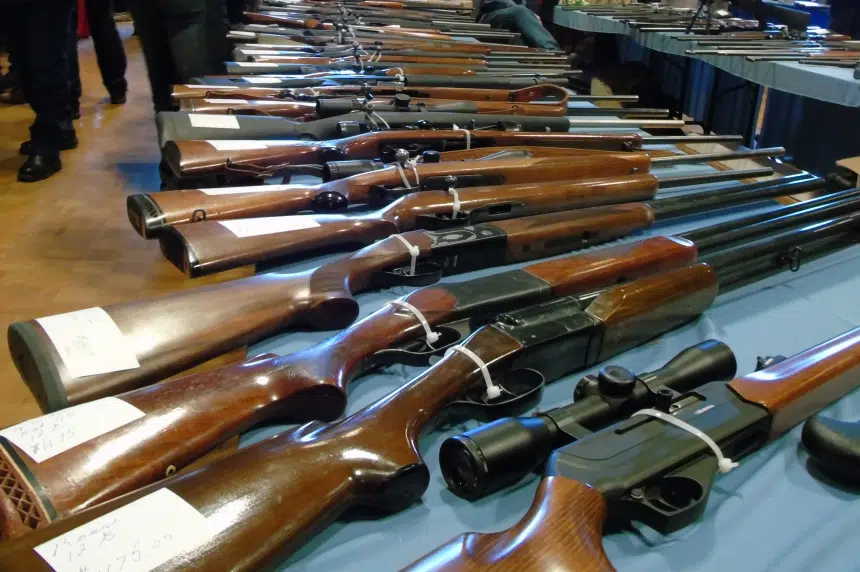It’s not exactly a rare occurrence in Regina to hear about one crime or another that involved someone with a gun, whether they’re using it in a robbery, it’s found in a raid or, as happened on May 22, it’s being brandished at police.
According to the Regina Police Service’s Supt. Corey Zaharuk, the majority of guns seized in Regina are what he calls domestically sourced.
“The vast majority of illegal firearm usage in our city is the result of people accessing guns from property crimes or other means and using them for illegal purposes,” said Zaharuk.
Sometimes police in Regina will encounter guns smuggled over the border, but Zaharuk said it’s rare compared to guns being stolen and modified.
And while bigger cities like Toronto have a big problem with handguns, in Regina and Saskatchewan, that’s not the case.
“We do see handguns, but the most common type of firearm that we’re encountering when it’s being used for an illegal purpose is usually your long rifle cut down, sawed off, those kinds of things, and usually obtained by crime,” explained Zaharuk.
He put the difference in weapon down to a difference in region; there are more long guns around in Saskatchewan.
At the beginning of the month, Prime Minister Justin Trudeau announced a ban on about 1,500 different models of guns which were described as assault-style weapons. It’s argued those guns are more suited to war than to sport shooting or hunting.
Zaharuk said the term “assault style” isn’t defined in the Criminal Code, but for these purposes, he said they’re either automatic or semi-automatic with ammunition and a magazine to fire multiple rounds quickly, and usually has a capacity of more than five rounds.
“We occasionally have seized those types of weapons. We have seized assault-type weapons, but they’re not as common as modified long guns,” said Zaharuk.
Zaharuk said it’s too early to say what kind of an impact the legislation will have, either in Canada or Regina.
“There are really strong, strict firearms regulations in Canada but that sometimes doesn’t preclude criminals from misusing firearms, using legal firearms in an illegal way,” said Zaharuk.
Gun tracing
The Regina police do what they can to trace guns when they’re seized. Zaharuk said police are always interested in whether a gun was used in a crime or if it was stolen. After that, they’ll try to find where the gun came from, but that can be a difficult process.
Zaharuk gave the example of a farmer who has a .22 near the back door. He said in some cases that could be a gun passed down through generations and then it likely wouldn’t be in any database, so if it were stolen then it wouldn’t be able to be tracked.
Zaharuk said when it comes to gun tracing, there’s a larger issue.
“That really starts to revolve around a public policy issue and it has been an ongoing public policy issue for decades, really, about how much tracking and tracing we should, as a country, be doing relating to firearms,” he said.
Regina gun crime
Crimes involving guns are actually down in Regina in 2020.
According to police statistics, gun crimes are down about 20 per cent for the period from January to the end of April compared to the same time last year. It’s the same for crimes against people.
Gun seizures in Regina are down about 40 per cent for the first four months of the year.
However, there has been a 62 per cent increase in the number of guns reported stolen in the city, which Zaharuk said is unusual. But he couldn’t say why it was happening.
If comments on social media are any indication, many people would be surprised to hear that gun crimes are down in Regina as they seem to feel things are getting worse.
Zaharuk said he doesn’t forget last year when, by the fall, there were almost 200 gun incidents. In the spring of 2019, there was one weekend with a number of gun incidents that had to be dealt with.
The 20 per cent decrease is good, said Zaharuk, but that doesn’t take away from the fact there’s gun violence in the city that needs to addressed.
Zaharuk said the pandemic has changed trends in crime for the city: Break and enters to homes are down because people are home more often but break and enters to businesses are up.
According to Zaharuk, there’s a recipe that goes into gun crime, including drug use, stolen vehicles and other property crime, and the drug trade and organized crime — all of which are areas to which the police pay a lot of attention.
Zaharuk said the work police have done on guns has had some success, including holding criminals accountable.
“We have a number of offenders that were responsible for a lot of firearm, property and drug crime over the last year that are in custody right now,” he said. “That definitely has an impact as well.”
And, as there are more guns in the community, the police have to increase their response. Zaharuk said, after the shooting of RCMP officers in Moncton in 2014, there was an evolution in police enforcement: They have better body armour, officers were trained in the use of carbines and now have access to them, and Regina police acquired a tactical rescue vehicle.
Zaharuk explained it’s in part because the standards around keeping police safe were raised.











